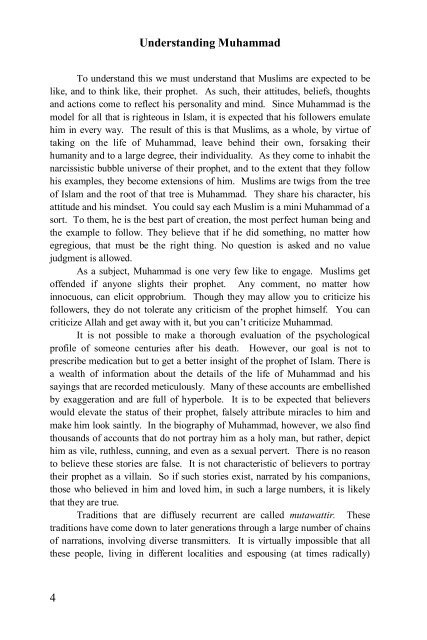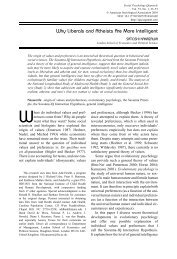Ali Sina - Understanding Muhammad
Ali Sina - Understanding Muhammad
Ali Sina - Understanding Muhammad
Create successful ePaper yourself
Turn your PDF publications into a flip-book with our unique Google optimized e-Paper software.
<strong>Understanding</strong> <strong>Muhammad</strong><br />
To understand this we must understand that Muslims are expected to be<br />
like, and to think like, their prophet. As such, their attitudes, beliefs, thoughts<br />
and actions come to reflect his personality and mind. Since <strong>Muhammad</strong> is the<br />
model for all that is righteous in Islam, it is expected that his followers emulate<br />
him in every way. The result of this is that Muslims, as a whole, by virtue of<br />
taking on the life of <strong>Muhammad</strong>, leave behind their own, forsaking their<br />
humanity and to a large degree, their individuality. As they come to inhabit the<br />
narcissistic bubble universe of their prophet, and to the extent that they follow<br />
his examples, they become extensions of him. Muslims are twigs from the tree<br />
of Islam and the root of that tree is <strong>Muhammad</strong>. They share his character, his<br />
attitude and his mindset. You could say each Muslim is a mini <strong>Muhammad</strong> of a<br />
sort. To them, he is the best part of creation, the most perfect human being and<br />
the example to follow. They believe that if he did something, no matter how<br />
egregious, that must be the right thing. No question is asked and no value<br />
judgment is allowed.<br />
As a subject, <strong>Muhammad</strong> is one very few like to engage. Muslims get<br />
offended if anyone slights their prophet. Any comment, no matter how<br />
innocuous, can elicit opprobrium. Though they may allow you to criticize his<br />
followers, they do not tolerate any criticism of the prophet himself. You can<br />
criticize Allah and get away with it, but you can’t criticize <strong>Muhammad</strong>.<br />
It is not possible to make a thorough evaluation of the psychological<br />
profile of someone centuries after his death. However, our goal is not to<br />
prescribe medication but to get a better insight of the prophet of Islam. There is<br />
a wealth of information about the details of the life of <strong>Muhammad</strong> and his<br />
sayings that are recorded meticulously. Many of these accounts are embellished<br />
by exaggeration and are full of hyperbole. It is to be expected that believers<br />
would elevate the status of their prophet, falsely attribute miracles to him and<br />
make him look saintly. In the biography of <strong>Muhammad</strong>, however, we also find<br />
thousands of accounts that do not portray him as a holy man, but rather, depict<br />
him as vile, ruthless, cunning, and even as a sexual pervert. There is no reason<br />
to believe these stories are false. It is not characteristic of believers to portray<br />
their prophet as a villain. So if such stories exist, narrated by his companions,<br />
those who believed in him and loved him, in such a large numbers, it is likely<br />
that they are true.<br />
Traditions that are diffusely recurrent are called mutawattir. These<br />
traditions have come down to later generations through a large number of chains<br />
of narrations, involving diverse transmitters. It is virtually impossible that all<br />
these people, living in different localities and espousing (at times radically)<br />
4






